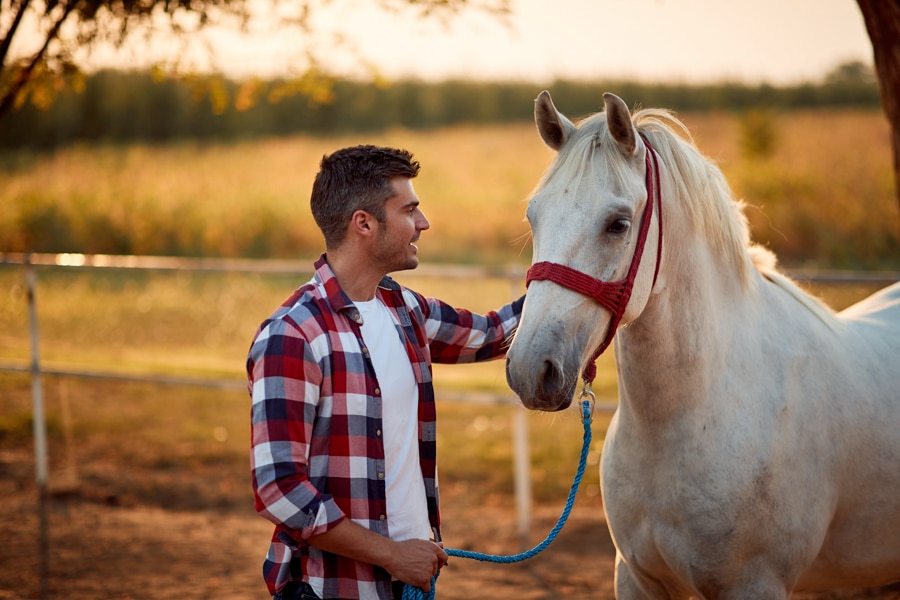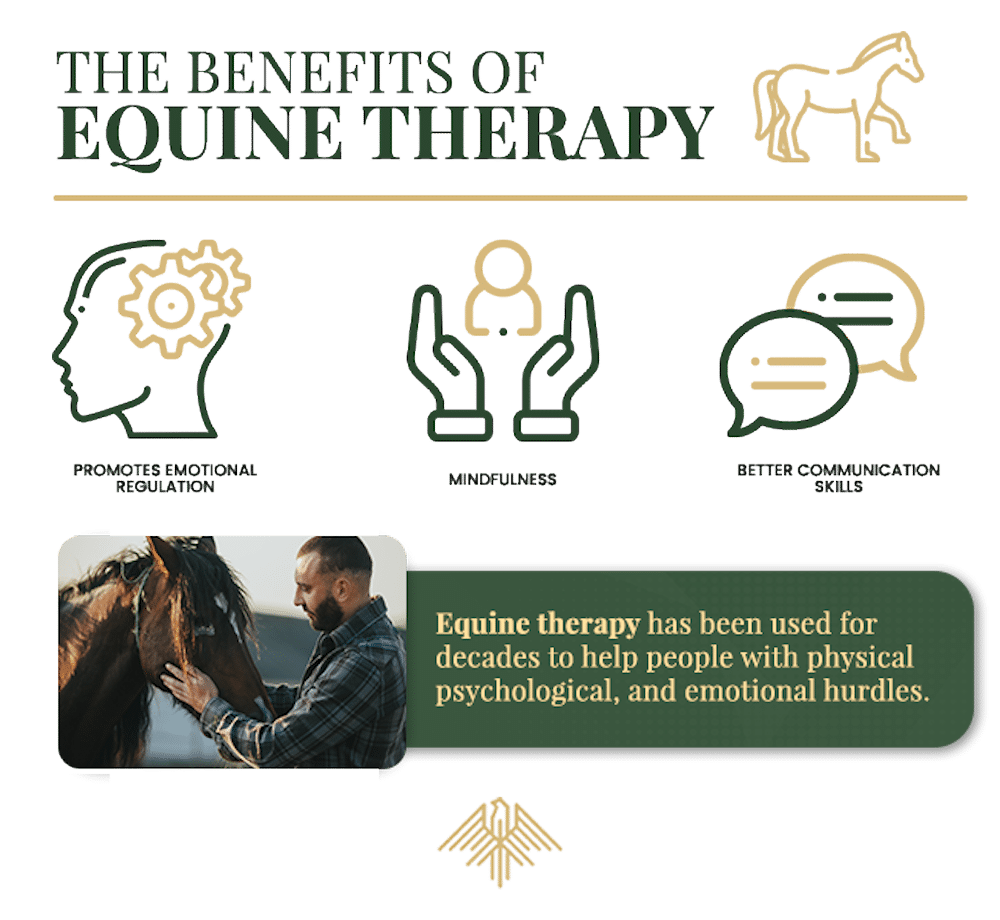Equine Therapy for Addiction Treatment

Equine therapy, a modality gaining recognition in the field of mental health, leverages the intuitive and non-judgmental nature of horses to create a dynamic and transformative therapeutic environment. For people struggling with addiction, equine therapy provides a safe, non-judgmental space to confront and express emotional and psychological challenges.
In Idaho, horses can offer unconditional love, accepting individuals without judgment, which fosters trust and emotional openness as a key part of the therapeutic process. Horse-assisted therapy can create space for breakthroughs and can help individuals heal emotionally and psychologically in a peaceful setting.
From anxiety disorders to autism spectrum disorders, equine therapy has shown promising results in alleviating symptoms and fostering emotional well-being.
In Idaho, equine therapy, also referred to as equine-assisted therapy or equine-assisted psychotherapy, has been used for decades to help people with physical, psychological, and emotional challenges. The first recorded use of equine therapy dates back to around 400 BC, when the ancient Greeks employed it. However, the earliest organized and documented therapeutic riding programs began in Europe in the late 1800s.
Modern equine therapy was developed in the 1950s by several people (including a psychologist named M. Becker), who found that interacting with horses had the potential to benefit people with disabilities. In the 1960s and 1970s, equine-assisted therapy initiatives emerged in the United States and Canada.
Today, equine therapy includes numerous techniques and disciplines used to promote health and wellness. The most common types are therapeutic horseback riding, equine-facilitated psychotherapy, and equine-assisted learning. During sessions, clients may learn horse care and riding skills, communicate with the horse, and navigate obstacle courses. This can help to build confidence, balance, flexibility, and muscle control.
Types of Equine Therapy
Equine therapy encompasses a wide range of horse-related therapies. Examples of equine therapy include:
This is one of the most common forms of equine therapy. It involves riding horses under the supervision of trained therapists to improve physical, emotional, and cognitive functions. The rhythmic movement of the horse is believed to stimulate and enhance the rider’s muscles, balance, and coordination.
Within this therapeutic approach, mental health professionals collaborate with clients and horses to tackle emotional and psychological challenges. The focus is on building a therapeutic relationship between the client and the horse, often in a non-riding setting. This process encourages the person to be honest with themselves and become more emotionally aware through interactions with the horse. Interactions with the horse are used as metaphors for real-life situations, fostering self-awareness and emotional growth.
EAL includes structured activities with horses to foster personal development and learning. Participants engage in ground-based exercises rather than riding, focusing on tasks designed to encourage problem-solving, communication, and teamwork. This therapy technique is commonly applied in educational and corporate environments to help with team building and promote leadership development.
This approach emphasizes building a partnership between the individual and the horse based on trust, respect, and clear communication. Groundwork and horse care activities are often central components, promoting emotional healing and growth of self-esteem through establishing a strong human-animal bond.
Contact Eagle Creek Ranch
Recovery Today!
Why Wait? Find The Help You Need By Reaching Out To Us Today! Our Admissions Team Is Standing By.

Benefits of Equine Therapy
Equine therapy in Idaho has proven effective for individuals grappling with addiction and diverse mental health disorders and/or learning challenges. The benefits stem from the meaningful relationship and bond formed with the horse. Specifically, equine therapy for addiction can help build helpful skills for those in addiction recovery.
Equine therapy is a valuable way for people to practice navigating their emotions. It can support recovery in people in addiction treatment by helping them practice the skills they need to confront the emotional roots of their substance use. Horses, non-judgmental and supportive, create a secure space for individuals to express and understand feelings. In equine-assisted therapy, individuals address difficult emotions such as fear or frustration. However, the in-the-moment nature of equine therapy encourages honest emotional expression and ultimately leads to healing. Many individuals find increased emotional awareness, enhanced resilience, and greater overall contentment through this therapeutic approach.
Equine therapy can help individuals develop communication skills, with a special emphasis on non-verbal cues and body language. As participants learn to convey intentions clearly without words in interactions with the horses, this skill set can extend beyond the therapy arena. This can help promote and foster authentic connections, resulting in more meaningful and effective communication in social contexts with humans.
Equine therapy offers a harmonious blend of physical and mental health activities simultaneously. Engaging in horse-related activities, such as riding and groundwork exercises, can help enhance physical fitness by improving balance, coordination, strength, and flexibility. The therapeutic interaction with horses serves as a powerful stress-reduction method. This dual impact on both physical health and stress management is what solidifies equine therapy’s place in holistic treatment for addiction,
Spending time with horses can help people concentrate on the present moment, a concept known as mindfulness. Horses, with their calm and non-judgmental demeanor, create a tranquil environment. This can help individuals to feel centered and attentive, not dwelling on the past or the future. The gentle movements of the horse and natural surroundings add to the feeling of being present. Practicing mindfulness with horses can bring balance, self-awareness, and a more profound connection to the present moment.
Equine therapy helps people develop healthy ways to handle challenges. Working with horses offers a practical and hands-on approach to practicing coping strategies for stress, frustration, or other challenging emotions. People may find that they handle stress and difficulties better by applying the coping strategies they learned while working with horses. Equine therapy can be a practical space for building confidence and resilience in the face of life’s challenges. The phrase “get back on the horse” can be a valuable lesson in equine therapy for addiction.
What Conditions Can Be Addressed Through Equine Therapy?

Horses are very social animals, and can pick up on how people act and feel. As a result, they provide honest, non-judgmental feedback in real-time. This helps you understand how your thoughts and feelings influence your actions. Equine therapy can help individuals become more aware of themselves and the energy they emit into the world, which can, in turn, enhance communication, foster trust, and boost confidence.
Equine therapy can be particularly helpful for those dealing with:
- Anxiety and Depression: Caring for horses is sometimes used as a therapeutic treatment for anxiety and depression disorders (as well as other mental health conditions). It can help reduce stress and boost serotonin levels. The meaningful connection formed with horses (and animals in general) can help contribute to positive emotional well-being.
- PTSD: Horses can be vital partners in the healing journey for those with post-traumatic stress disorder (PTSD). Their quiet awareness helps create a safe space, fostering openness and helping to build trust crucial for recovery.
- Addiction: In a collaborative environment, interaction with horses can help build empathy, refine communication skills, and boost confidence. All of these can help support individuals on their path to recovery. Working with horses can encourage honest emotional expression, helping individuals to practice healthy coping mechanisms.
Unlike traditional therapy, which often relies on talk-based methods and may feel too vulnerable for some people, equine therapy offers a unique, non-judgmental environment. This holistic approach can promote genuine emotional expression in a natural environment. People who don’t find traditional therapy appealing may enjoy the benefits of equine therapy that they may not have gained from traditional addiction-focused therapy.
What to Consider Before Starting Equine Therapy
Before beginning or signing up for equine therapy, it’s essential to consider several key factors:
- Session Duration and Frequency: Discuss the recommended duration and frequency of equine therapy sessions. Understand the time commitment required and ensure that it aligns with your overall treatment plan.
- Individual Needs and Goals: Clearly define your individual needs and therapeutic goals. Discuss these with a mental health therapist or another member of your treatment team to ensure that the program is tailored to address your specific concerns and objectives.
- Comfort with Horses: If you have reservations or concerns about horses, please discuss these with the therapy team. They can tailor the program to gradually build your comfort and confidence in interacting with the animals.
- Long-Term Integration: Consider the potential for long-term integration of equine therapy into your overall treatment plan. If you find that you’re seeing benefits from equine therapy, it may be possible to find a way to work with horses after treatment as part of a sober lifestyle.
By considering these factors, you can create a positive and beneficial experience with equine therapy that meets your individual needs and goals.
Heal From Addiction at Eagle Creek Ranch Recovery
Take a step toward healing from addiction at Eagle Creek Ranch Recovery. We provide resources to help men recover from alcohol and drug abuse in holistic ways. In addition to equine-assisted therapy, individuals can participate in Reiki, acupuncture, yoga, and other holistic treatments. This is in addition to individual therapy, cognitive behavioral therapy, group therapy, and other evidence-based treatment options.
You don’t need to deal with addiction alone. Start your path to a healthier life at Eagle Creek, where addiction treatment is customized to fit your goals and needs. Contact us today to learn more.

Clinical Director
Kendall Maloof is the clinical director at Eagle Creek Ranch Recovery. She is a licensed marriage and family therapist and has held multiple leadership roles before settling here at Eagle Creek Ranch Recovery. Kendall received her master’s degree in marriage and family therapy from the Chicago School of Professional Psychology in 2016. Her career in mental and behavioral health began in 2014 when she took up internships in both the nonprofit and for profit sectors. She interned at multiple reputable companies, such as The Living Success Center and 449 Recovery in California.
In 2019, Kendall became the clinical director of Sunsets Recovery for Woman, a dual diagnosis program in southern California. Kendall is a natural leader. She has an incredible ability to problem solve and stay calm in any situation. Kendall never fails to show up when she is needed, and her calm demeanor makes her team and clients feel at ease. Eagle Creek Ranch Recovery is proud to have Kendall as our clinical director.


